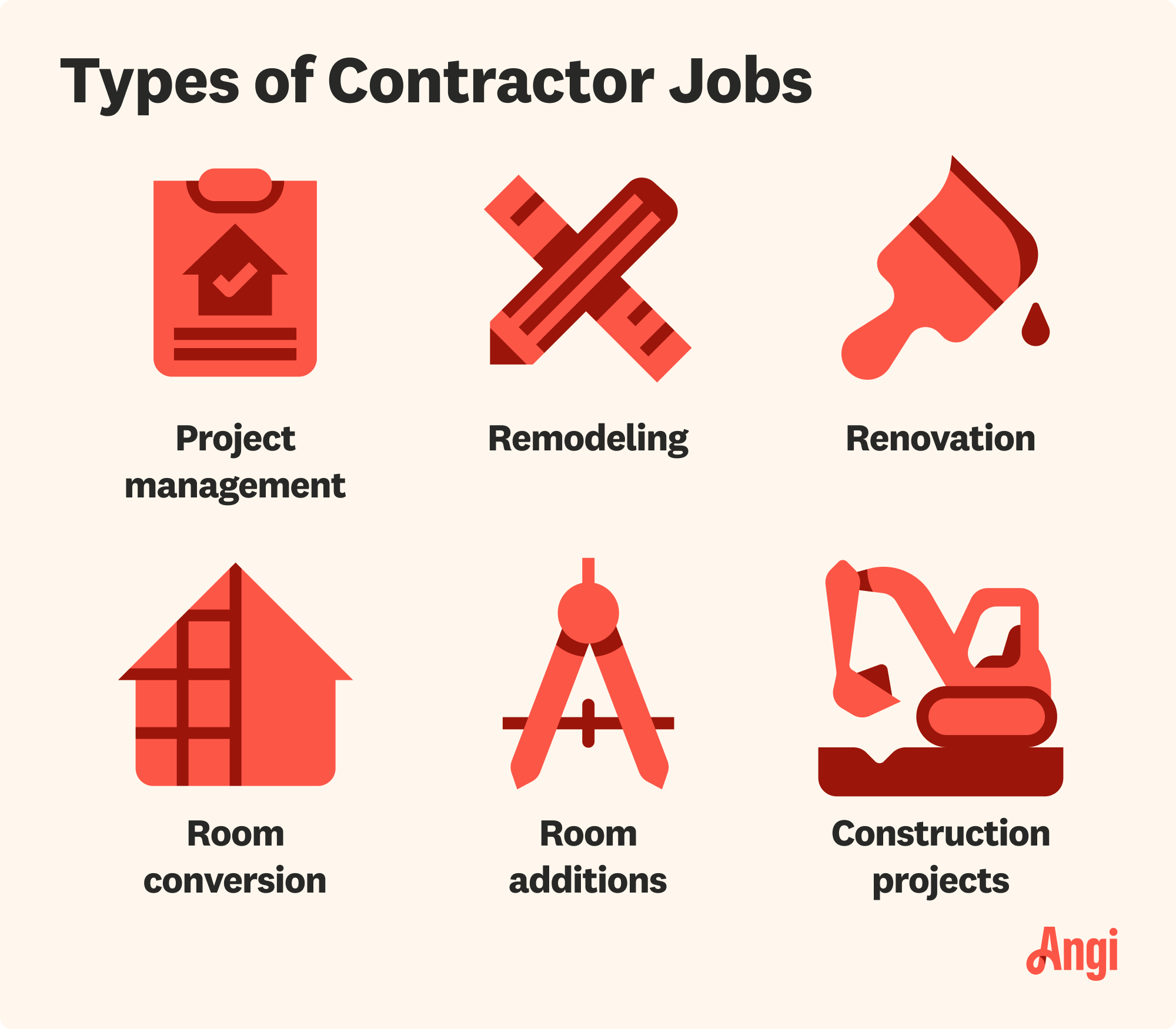Your home is your sanctuary, and when something breaks, it can feel overwhelming. But how do you know when it’s time to call in a professional?
You might be tempted to fix things yourself or wait it out, but some repairs need expert hands to save you time, money, and stress. You’ll discover the key signs that tell you exactly when to hire a contractor for your home repairs.
Keep reading—you’ll learn how to protect your investment and avoid costly mistakes.
Signs You Need A Contractor
Home repairs can range from simple fixes to major projects. Knowing when to call a contractor saves time and keeps you safe.
Some repairs need special skills and tools. Look for signs that a professional is needed to get the job done right.
Complex Repairs Beyond Diy
Some repairs are too hard for a typical homeowner. These tasks need experience and special tools to avoid mistakes.
Examples include fixing electrical wiring, plumbing pipes, or major roof damage. These jobs require precise work to prevent bigger problems.
- Electrical system repairs
- Plumbing leaks or pipe replacements
- Structural damage like cracks in walls
- Roof repairs after storms
Safety Concerns At Home
Some repairs can be dangerous without training. Handling gas lines or working at heights needs a skilled contractor.
Ignoring safety rules can cause injuries or damage. A professional knows how to protect you and your home.
- Gas or propane line repairs
- Electrical wiring upgrades
- Working on ladders or roofs
- Asbestos or mold removal
Time Constraints And Skill Gaps
Some home repairs take a lot of time and skill. If you lack these, hiring a contractor saves effort and stress.
Contractors finish work faster because they have tools and know-how. This helps if you need repairs done quickly.
- Limited free time for repairs
- Missing experience in certain tasks
- Need for quick, quality work
- Desire to avoid trial and error

Credit: www.angi.com
Types Of Repairs Requiring Experts
Not all home repairs are easy to fix by yourself. Some need special skills and tools. Hiring a contractor can save time and keep your home safe.
Experts know how to handle complex problems. They follow rules and use the right materials. Here are common repairs that need a contractor.
Structural Damage
Structural damage affects your home’s stability. Cracks in walls, sinking floors, or damaged beams need expert care. Fixing these problems requires special knowledge.
Contractors inspect the damage and plan safe repairs. They use tools to support the structure and prevent more harm.
Electrical And Plumbing Issues
Electrical problems can cause fires or shocks. Plumbing issues can lead to leaks and water damage. Both need trained professionals.
Licensed contractors follow safety codes. They fix wiring, pipes, and fixtures properly. This work keeps your home safe and running well.
Roofing And Exterior Work
Roof repairs need skill to avoid leaks and damage. Exterior work like siding or decks also requires experience. These jobs protect your home from weather.
Contractors use the right materials and techniques. They ensure the roof and outside parts last longer and look good.
Benefits Of Hiring A Contractor
Hiring a contractor for home repairs brings many advantages. They have the skills and experience to do the job right.
A contractor can save you time and reduce stress. They handle the details and ensure safety during the repairs.
Quality And Longevity
Contractors use quality materials and follow building codes. This helps your repairs last longer and stay safe.
They know how to fix problems correctly. Poor repairs can cause more damage and cost more later.
Cost Efficiency Over Time
Though contractors may seem costly at first, they save money in the long run. Good repairs lower the chance of future issues.
They avoid mistakes that can lead to expensive fixes. Proper work means less need for repeat repairs.
- Reduces risk of damage
- Prevents costly repairs later
- Improves home value
Access To Professional Tools
Contractors have the right tools for each job. This helps them work faster and with better results.
Using proper tools also keeps the repair safe. It avoids damage to your home and reduces accidents.

Credit: allbetterapp.com
How To Choose The Right Contractor
Hiring the right contractor is important for home repairs. The right choice saves you time and money.
Follow simple steps to find a trustworthy and skilled contractor for your project.
Checking Credentials And Licenses
Make sure the contractor has the right licenses for your area. This shows they follow local laws.
Check if they have insurance. Insurance protects you if accidents happen during work.
- Verify state or local licenses
- Ask for proof of insurance
- Confirm bonding status if needed
Reading Reviews And Getting References
Read online reviews to see what past customers say. Look for patterns in feedback.
Ask the contractor for references. Call or visit past clients to hear about their experience.
- Check multiple review sites
- Ask about work quality and timeliness
- Inquire about professionalism and cleanup
Comparing Quotes And Services
Get quotes from several contractors. Compare prices and what services each includes.
Look beyond price. Consider the quality of materials and warranty offered.
| Factor | What to Check |
|---|---|
| Price | Is it within your budget? |
| Materials | Are quality materials included? |
| Warranty | What kind of guarantee is offered? |
| Timeline | How long will the work take? |
What To Expect During The Repair Process
Hiring a contractor for home repairs can make the job easier and safer. Knowing what happens during the repair process helps you stay informed.
This guide explains the main steps you will see when working with a contractor.
Initial Assessment And Estimate
The contractor first inspects the problem area in your home. They check the damage and decide what repairs are needed.
After the inspection, the contractor gives you an estimate. This includes the cost and materials needed for the repair.
- Detailed inspection of the issue
- List of materials and tools needed
- Estimated time to complete the work
- Cost breakdown for labor and supplies
Project Timeline And Communication
The contractor sets a schedule for the repair work. This timeline shows when the project will start and finish.
Good communication is important. The contractor should update you about progress and any changes.
- Start and end dates for the project
- Regular updates on work progress
- Notice of any delays or problems
- Clear answers to your questions
Final Inspection And Payment
When the repair is complete, you and the contractor inspect the work. Check that all repairs meet your expectations.
After you approve the work, you make the final payment. Keep all receipts and documents for your records.
- Walkthrough to check repairs
- Confirm all tasks are finished
- Make final payment
- Save receipts and warranty papers

Credit: www.houselogic.com
Tips To Avoid Common Hiring Mistakes
Hiring a contractor for home repairs can be tricky. Many people make mistakes that cause delays or extra costs.
Knowing what to watch for helps you choose the right person for your project. This guide covers key tips.
Avoiding Unlicensed Contractors
Always check if the contractor has a valid license. Unlicensed workers may not follow safety rules.
Licenses prove that the contractor has training and meets local laws.
- Ask to see their license before hiring
- Verify the license with your state or city office
- Avoid contractors who refuse to show proof
Clarifying Project Scope And Costs
Be clear about what repairs you want. Write down each task to avoid confusion.
Ask for a detailed cost estimate. This should include labor, materials, and extra fees.
- List all repair tasks and materials needed
- Get a written estimate before work starts
- Discuss how changes will affect the price
Ensuring Proper Contracts And Warranties
Always use a written contract. It protects you and the contractor during the project.
The contract should describe work, costs, and timelines. Check if warranties cover the repairs.
- Get all promises in writing
- Check the length and terms of warranties
- Keep copies of all signed documents
Frequently Asked Questions
When Is It Necessary To Hire A Contractor For Home Repairs?
Hiring a contractor is necessary for complex or large-scale repairs. They ensure quality, safety, and compliance with local codes. Simple fixes can be DIY, but major electrical, plumbing, or structural issues need professional expertise.
How Do I Know If A Home Repair Needs A Contractor?
If the repair involves specialized skills, permits, or tools, hire a contractor. Projects like roof replacement, foundation fixes, or major renovations require professionals to avoid costly mistakes.
What Are The Benefits Of Hiring A Professional Contractor?
Professional contractors provide expert knowledge, save time, and ensure safety. They handle permits, use quality materials, and offer warranties. This reduces stress and guarantees a reliable, lasting repair.
Can I Save Money By Not Hiring A Contractor?
DIY repairs can save money but risk poor results or damage. Hiring a contractor may cost more upfront but prevents costly future repairs and ensures work meets standards.
Conclusion
Deciding when to hire a contractor can save you time and stress. Complex repairs often need professional skills. Safety is another important consideration. Contractors know the right tools and techniques. Hiring them ensures quality work. They also have proper licenses and insurance.
This protects you from future issues. Weigh the costs and benefits carefully. Consider your own skills and time availability. A reliable contractor can make home repairs easier. Your home deserves the best care. Choosing wisely leads to successful repairs.
8 min read

